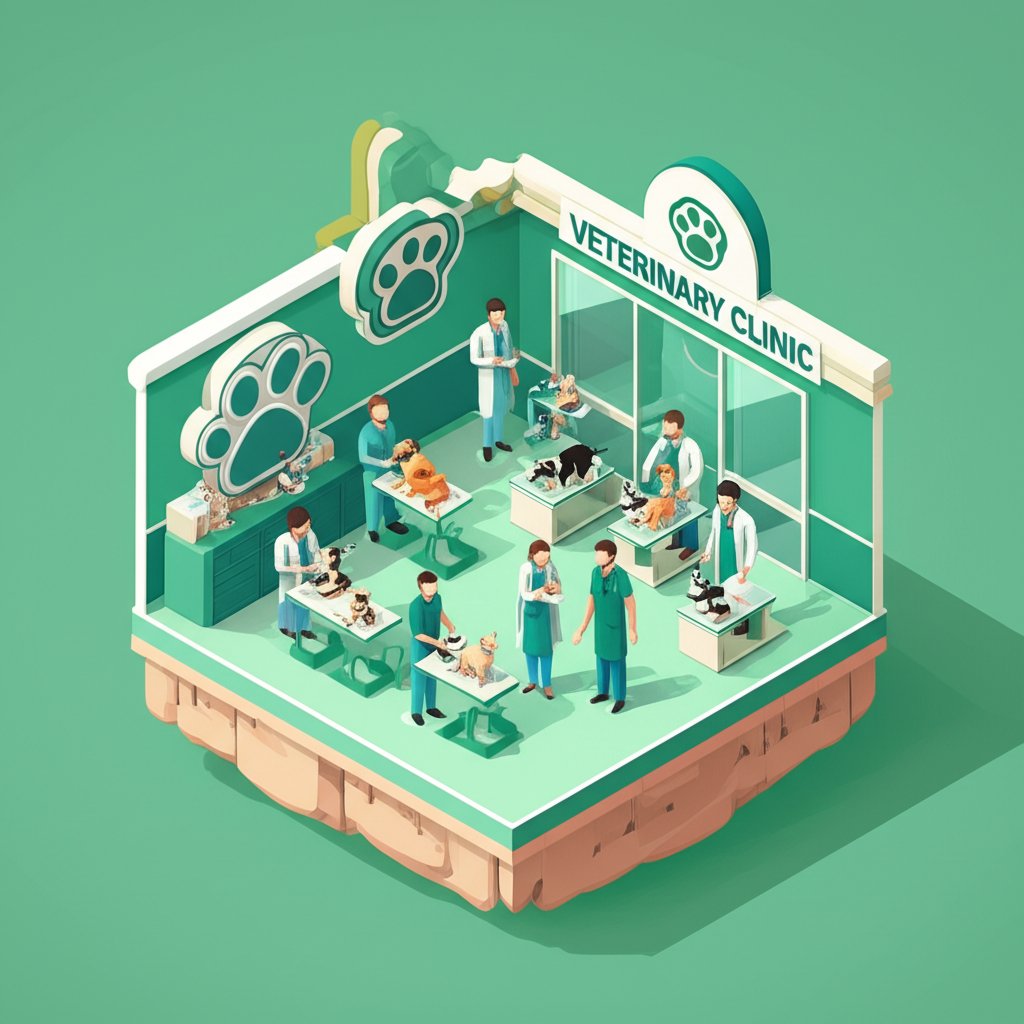As devoted pet parents, we cherish our animal companions, viewing them as integral members of our families. Their well-being isn’t just a concern – it’s a priority. While our primary care veterinarians are indispensable, there are times when our beloved pets face complex or unusual health challenges that require a level of animal care beyond general practice. This is where veterinary specialists step in, offering unparalleled expertise and cutting-edge veterinary medicine to diagnose, treat, and manage even the most intricate conditions.
In this comprehensive guide, we’ll delve into the world of veterinary experts, uncovering their profound impact on animal health. We’ll explore their rigorous training, the diverse range of specialties they represent, the advanced techniques they employ, and how they collaborate to ensure your pet receives the most elite care possible. Prepare to discover how these dedicated professionals are truly unlocking a brighter, healthier future for all animals.
To ensure your furry friend receives the best possible care, understanding the difference between general practitioners and specialists, along with other insights into the veterinary field, can be invaluable, so explore these veterinarian’s secrets to become a more informed pet owner.
What Exactly Are Veterinary Specialists? Defining the Elite in Animal Care

Just as human medicine has its cardiologists, neurologists, and oncologists, veterinary medicine has its own specialized fields. Veterinary specialists are veterinarians who have pursued extensive post-doctoral training, education, and examination to become board-certified in a specific area of animal health. This distinction signifies a profound depth of knowledge and skill, setting them apart as leading veterinary experts.
Beyond the General Practitioner: A Deeper Dive into Veterinary Expertise
While your general practice veterinarian is a highly skilled and vital professional, providing cornerstone preventative care, routine examinations, and managing common illnesses, their scope is broad. Veterinary specialists, however, narrow their focus to become masters of a particular system, disease, or species. This allows them to tackle cases that might be too complex or rare for a generalist, offering advanced diagnostics, precise treatments, and specialized management plans. They are an invaluable resource, often working in conjunction with your family vet to provide a continuum of superior animal care.
The Rigorous Path to Becoming a Board-Certified Specialist
The journey to becoming a board-certified veterinary specialist is arduous and demanding, typically spanning an additional 3-6 years after completing four years of veterinary school. This intensive path includes:
- Doctor of Veterinary Medicine (DVM): The foundational degree from an accredited veterinary college.
- Internship: A one-year rotating internship providing broad clinical experience in various disciplines.
- Residency: A 2-3 year intensive training program focused exclusively on a chosen specialty. This involves hands-on clinical work, research, teaching, and often publishing in scientific journals.
- Board Certification Examination: A rigorous multi-day examination administered by an American Veterinary Medical Association (AVMA) or European Board of Veterinary Specialists (EBVS) recognized specialty college. Passing this exam confers board certification, signifying the highest level of competence and expertise in that field.
This meticulous process ensures that veterinary experts are at the forefront of their discipline, equipped with the latest knowledge and techniques to achieve optimal animal health outcomes.
The Role of Authoritative Bodies: AVMA and EBVS
Central to maintaining the high standards of veterinary specialists are authoritative organizations like the American Veterinary Medical Association (AVMA) in the United States and the European Board of Veterinary Specialists (EBVS) in Europe. These bodies recognize and oversee the various specialty colleges.
- AVMA: In the U.S., the AVMA officially recognizes 22 veterinary specialty organizations representing 41 distinct specialties. They maintain a comprehensive list of board-certified veterinary experts, ensuring that practitioners meet stringent educational and experiential criteria.
- EBVS: Across Europe, the EBVS serves a similar function, accrediting colleges and certifying over 4,000 European Veterinary Specialists across disciplines ranging from Anesthesia and Analgesia to Clinical Pathology.
These organizations play a crucial role in safeguarding the quality of veterinary medicine and providing pet owners with confidence in the credentials of their chosen animal care providers.
A Spectrum of Expertise: Key Specialties in Modern Veterinary Medicine
The breadth of veterinary specialists is vast, reflecting the intricate complexities of animal health. Each specialty is dedicated to a specific area, ensuring that every nuance of a pet’s condition can be addressed with targeted expertise.
Internal Medicine Specialists: Solving Complex Puzzles
Veterinary Internal Medicine specialists are like detectives, specializing in the diagnosis and non-surgical treatment of diseases affecting internal organ systems. They are often consulted for chronic vomiting or diarrhea, unexplained weight loss, liver disease, kidney failure, hormonal disorders (like diabetes or Cushing’s disease), and certain infectious diseases. Their advanced diagnostic tools include ultrasound, endoscopy, and complex laboratory analyses to unravel the mysteries of internal illness. Both Small Animal and Large Animal Internal Medicine specialists exist, catering to the unique physiological differences of their patients.
Surgical Specialists: Precision and Advanced Procedures
Board-certified Veterinary Surgeons perform advanced surgical procedures that require specialized training and equipment. These veterinary experts handle intricate operations such as orthopedic surgeries (fracture repair, ligament tears), soft tissue surgeries (tumor removal, abdominal procedures), and neurosurgeries (spinal cord issues). Their precision and experience significantly improve outcomes for complex surgical cases, making critical contributions to animal health.
Cardiology: Keeping Animal Hearts Healthy
Veterinary Cardiologists focus on the diagnosis and treatment of heart and circulatory system diseases. From congenital heart defects in puppies to acquired heart conditions like cardiomyopathy or degenerative valve disease in older pets, these veterinary specialists use advanced imaging (echocardiography), electrocardiography (ECG), and Holter monitoring to manage and treat heart conditions, often significantly improving animals’ quality of life and longevity.
Neurology: Understanding the Animal Brain and Nervous System
Veterinary Neurologists are veterinary experts in disorders of the brain, spinal cord, nerves, and muscles. They treat conditions such as seizures, intervertebral disc disease, paralysis, balance disorders, and brain tumors. Utilizing advanced imaging techniques like MRI and CT scans, along with electrodiagnostics, they provide precise diagnoses and tailored treatment plans for complex neurological challenges, enhancing overall animal care.
Oncology: Fighting Animal Cancer with Advanced Strategies
When a pet is diagnosed with cancer, a Veterinary Oncologist becomes a vital member of their animal care team. These veterinary specialists are experts in diagnosing and treating various cancers using chemotherapy, radiation therapy, immunotherapy, and targeted therapies. They develop comprehensive, individualized treatment plans aimed at prolonging life, improving quality of life, and, in some cases, achieving remission.
Other Critical Specialties: From Ophthalmology to Dentistry
The scope of veterinary specialists extends far beyond these examples. Other essential fields include:
- Ophthalmology: Treating eye diseases and conditions.
- Dentistry and Oral Surgery: Addressing complex dental and oral health issues.
- Dermatology: Diagnosing and managing chronic skin and ear diseases.
- Anesthesiology: Ensuring safe and effective pain management and anesthesia for procedures.
- Emergency and Critical Care: Providing intensive care for critically ill or injured animals around the clock.
- Behavior: Helping pets and owners manage behavioral disorders.
- Nutrition: Developing specialized dietary plans for various health conditions.
- Radiology: Interpreting advanced imaging studies like X-rays, CTs, and MRIs.
- Zoological Medicine: Specializing in the animal health of exotic and zoo animals.
Each of these veterinary experts brings a unique and indispensable contribution to comprehensive animal care.
The Unrivaled Benefits of Specialist-Led Animal Health

Engaging veterinary specialists in your pet’s animal care offers a multitude of advantages that can profoundly impact their animal health and well-being.
Enhanced Diagnostics and Targeted Treatment Plans
Veterinary specialists have access to, and expertise in, the most advanced diagnostic technologies. This includes high-resolution imaging (MRI, CT, advanced ultrasound), sophisticated laboratory tests, and specialized procedural skills (e.g., biopsies guided by endoscopy). Their focused knowledge allows for more accurate and often earlier diagnoses, leading to highly targeted and effective treatment plans that might not be available in a general practice setting. This precision in veterinary medicine is critical for complex conditions.
Collaborative Animal Care: The Triad of Trust
One of the most powerful aspects of specialist animal care is the “Triad of Care” model. This involves a collaborative partnership between:
- The Pet Owner: Your insights into your pet’s behavior, history, and symptoms are invaluable.
- The Primary Care Veterinarian: They provide continuity of care, manage overall health, and facilitate referrals.
- The Veterinary Specialist: They offer advanced diagnostic and treatment options for specific conditions.
This collaborative approach ensures that all aspects of your pet’s animal health are considered, leading to a holistic and comprehensive veterinary medicine strategy. Your general vet and the specialist communicate closely, ensuring a seamless transition and integrated management plan.
Improving Quality of Life and Prognosis for Complex Cases
For animals facing serious or chronic conditions, the intervention of veterinary specialists can be life-changing. Their ability to deliver advanced therapies, perform intricate surgeries, or manage long-term diseases with specialized protocols often significantly improves a pet’s quality of life, reduces suffering, and can extend their lifespan. For instance, a pet with a debilitating orthopedic injury might regain full mobility after specialist surgery, or a diabetic pet might achieve better glycemic control under the guidance of an internal medicine specialist, leading to a much happier and healthier life.
Integrating Cutting-Edge Technology and Research
Veterinary specialists are consistently at the forefront of veterinary medicine, often involved in research, clinical trials, and the adoption of new technologies. This means your pet benefits from the latest advancements, whether it’s a novel surgical technique, a breakthrough cancer treatment, or state-of-the-art diagnostic imaging. Their dedication to evolving practices ensures that animal health care remains progressive and effective.
When to Seek Veterinary Experts: Recognizing the Need for Specialized Care
Knowing when to consult a veterinary specialist is crucial for optimizing your pet’s animal health. While your primary veterinarian will often recommend a referral, recognizing these signs can empower you as a pet owner.
Persistent or Unexplained Symptoms
If your pet demonstrates symptoms that are chronic, worsening, or defy diagnosis despite initial treatments from your general veterinarian, it’s a strong indicator that specialized insight is needed. Examples include:
- Uncontrolled seizures
- Severe or chronic lameness
- Persistent vomiting, diarrhea, or appetite changes
- Chronic skin or ear infections that do not respond to conventional therapy
- Unexplained weight loss or gain
These situations often require the focused diagnostic approach of veterinary experts.
Diagnosis of a Complex or Rare Condition
Upon diagnosis of a serious, complex, or rare disease, a referral to a specialist is typically recommended. Conditions like cancer, severe heart disease, neurological disorders, complex endocrine issues, or autoimmune diseases benefit immensely from the in-depth knowledge and experience of veterinary specialists. They can confirm diagnoses, stage diseases, and develop advanced treatment protocols.
Need for Advanced Procedures or Therapies
If your pet requires an intricate surgery, specialized rehabilitation, advanced imaging (like an MRI or CT scan), chemotherapy, or radiation therapy, a veterinary specialist is essential. These procedures demand specific equipment, facilities, and expertise that are typically only found in specialty or referral hospitals. For example, a dog with a torn ACL might require an orthopedic surgeon, while a cat with hyperthyroidism might benefit from radioactive iodine therapy overseen by an internal medicine specialist.
Second Opinions and Long-Term Management
Sometimes, even without a clear diagnosis, a second opinion from a veterinary expert can provide clarity and peace of mind. For pets with chronic conditions requiring lifelong management, a specialist can establish an optimal long-term plan, offering nuances in medication, diet, or monitoring that can significantly improve the animal’s prognosis and quality of life. They become long-term partners in your pet’s animal care.
The Future of Veterinary Medicine: Innovation Driven by Specialists
The field of veterinary medicine is dynamic, constantly evolving with technological advancements and new research. Veterinary specialists are at the vanguard of these innovations, shaping the future of animal health.
Advancements in AI and Personalized Animal Health
Artificial intelligence (AI) is already beginning to revolutionize animal care. Veterinary experts are utilizing AI-powered tools for:
- Enhanced Diagnostics: AI can analyze vast amounts of data, improving the accuracy and speed of diagnoses, particularly in image recognition (e.g., X-ray interpretation) and pathology.
- Predictive Analytics: Identifying animals at higher risk for certain diseases based on genetic markers or lifestyle data, allowing for proactive, personalized animal health strategies.
- Treatment Optimization: AI can help tailor treatment protocols to individual animals, predicting responses and minimizing side effects.
This integration of AI allows veterinary specialists to provide even more precise and personalized animal care.
Telemedicine and Remote Consultations with Veterinary Experts
The rise of telemedicine is making specialized veterinary medicine more accessible than ever. Remote consultations allow pet owners in rural areas or those with mobility challenges to consult with veterinary specialists without extensive travel. This is particularly valuable for follow-up appointments, reviewing diagnostic images, or managing chronic conditions, ensuring continuous and convenient animal health support.
A Holistic Approach: Integrating Animal Care with Environmental Well-being
Modern veterinary experts are increasingly recognizing the interconnectedness of animal health, human health, and environmental health – often referred to as “One Health.” This holistic perspective means that specialists are not only focusing on individual patient care but also considering broader factors like sustainable practices, preventing zoonotic diseases, and promoting environmental consciousness within veterinary medicine. This commitment to eco-friendly care, from reducing waste in clinics to advocating for responsible pet ownership, contributes to a healthier planet for all.
Genetic Therapies and Regenerative Medicine
The horizon of veterinary medicine includes exciting developments in genetic therapies and regenerative medicine. Veterinary specialists are exploring techniques like gene editing to correct genetic defects and stem cell therapy to repair damaged tissues and organs. These cutting-edge approaches hold immense promise for treating previously untreatable conditions, pushing the boundaries of what’s possible in animal health and demonstrating the continuous innovation driven by veterinary experts.
Conclusion
The world of veterinary specialists represents the pinnacle of animal care, offering an indispensable resource for optimizing our pets’ animal health. These board-certified veterinary experts, through their extensive training and dedication to advanced veterinary medicine, provide a level of diagnostic precision and therapeutic intervention that can be truly life-saving.
From internal medicine to oncology, neurology to surgery, each specialist plays a pivotal role in unraveling complex health mysteries and delivering targeted solutions. Their collaborative approach, often working hand-in-hand with primary care veterinarians, ensures that no animal’s condition is too challenging. As veterinary medicine continues its rapid evolution, driven by the innovations of these specialists, we can look forward to even brighter, healthier futures for our cherished companions. When your pet’s health demands the utmost expertise, remember that a veterinary specialist stands ready to unlock elite animal health care.
FAQ: Understanding Veterinary Specialists and Elite Animal Care
Question 1: What are veterinary specialists?
Answer 1: Veterinary specialists are veterinarians who have undergone extensive advanced training, education, and examination to become board-certified in a specific area of veterinary medicine, such as cardiology, oncology, or neurology. They provide advanced diagnosis, treatment, and management for complex or rare conditions, complementing the care provided by primary veterinarians. They are considered veterinary experts in their chosen field.
Question 2: How are board-certified veterinary specialists recognized?
Answer 2: In the United States, board-certified veterinary specialists are recognized by specialty colleges accredited by the American Veterinary Medical Association (AVMA). These specialists complete rigorous internships, residencies, and pass comprehensive board examinations. Similarly, in Europe, the European Board of Veterinary Specialists (EBVS) awards European Veterinary Specialist status based on rigorous postgraduate training and examinations. These certifications ensure a high standard of expertise in animal care.
Question 3: What is the role of European Veterinary Specialists?
Answer 3: European Veterinary Specialists, certified by the EBVS, are highly trained veterinary experts in specific disciplines of veterinary medicine across Europe. They uphold the highest standards of service and expertise, focusing on advanced diagnostics, specialized treatments, and preventive medicine to improve animal health, human health, and environmental well-being.
Question 4: How is European Veterinary Specialist status achieved?
Answer 4: European Veterinary Specialist status is achieved through a demanding process supervised by the EBVS. This typically involves completing a Doctor of Veterinary Medicine degree, followed by a mandatory internship, and then a 3-4 year residency program focused on a specific specialty. Candidates must also pass a rigorous board certification examination to demonstrate their advanced knowledge and proficiency in their specialized field of animal care.
Question 5: What is the role of advanced imaging in veterinary diagnosis and treatment?
Answer 5: Advanced imaging techniques, such as CT scans, MRI, and advanced ultrasound, are powerful tools extensively used by veterinary specialists. They provide detailed images of internal structures, aiding in the accurate diagnosis of complex conditions like tumors, neurological issues, and orthopedic injuries. These insights are crucial for developing effective, targeted treatment plans, significantly enhancing animal health outcomes.
Question 6: How do I know if my pet needs a veterinary specialist?
Answer 6: You should consider a veterinary specialist if your pet has persistent or unexplained symptoms, receives a diagnosis of a complex or rare condition (like cancer or severe heart disease), requires advanced procedures (such as intricate surgery or radiation therapy), or if you are seeking a second opinion or specialized long-term management for a chronic illness. Your primary veterinarian is often the best person to recommend a referral to appropriate veterinary experts.
Question 7: Can veterinary specialists treat exotic animals?
Answer 7: Yes, there are veterinary specialists specifically trained in Zoological Medicine or Exotics. These veterinary experts focus on the unique physiological, environmental, and medical needs of avian, reptile, amphibian, small mammal (e.g., rabbits, ferrets, guinea pigs), and other exotic species, providing highly specialized animal care for these unique pets.
Question 8: What’s the “Triad of Care”?
Answer 8: The “Triad of Care” is a collaborative model emphasizing the partnership between three key parties for optimal animal health: the pet owner, the primary care veterinarian, and the veterinary specialist. This team approach ensures comprehensive animal care, open communication, and the integration of all available expertise for the pet’s best interest.
Question 9: Is specialized animal care more expensive?
Answer 9: Generally, specialized animal care can be more expensive than general veterinary services due to the advanced training of the veterinary experts, the cost of specialized equipment (e.g., MRI machines, radiation therapy units), and the complexity of the diagnostic and treatment protocols. However, the investment often leads to more accurate diagnoses, more effective treatments, and ultimately, better animal health outcomes and quality of life for your pet. Pet insurance can help mitigate these costs.










